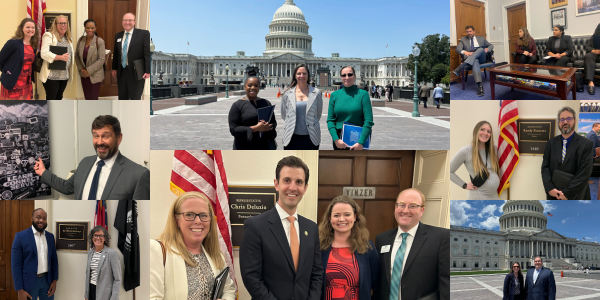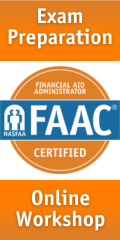Ten Reasons Financial Aid Professionals Think You Should Participate in NASFAA’s Advocacy Pipeline

NASFAA’s Advocacy Pipeline is an ongoing advocacy effort designed to bring NASFAA members to Washington, D.C. to share on-the-ground perspectives with policymakers. After meeting with their senators and representatives, participants write short reflections about their experiences. As NASFAA continues to advocate for the financial aid community, both in-person and virtually, we want to highlight why Advocacy Pipeline participants think you should also participate in this important initiative.
Interested in participating in the Advocacy Pipeline? Complete the Advocacy Pipeline Interest Form.
-
Highlights the people impacted by education policy
“Meeting with the staff of elected representatives is important because it puts a face to some of the people that education policy impacts.”
Scott Skaro, Financial Aid Director at United Tribes Technical College
“It was refreshing to step back from my day-to-day work and speak directly to policymakers who may not always see the impact their policies have on their constituents.”
Emmilee Mitchell, FAACⓇ; Director of Student Financial Planning Operations and Compliance at Mercer University
-
Provides an opportunity to step out of your comfort zone
“Let’s be honest: speaking with congressional staff is outside everyone’s comfort zone the first time they do it – but it’s so worth it.”
Melet Leafgreen, FAACⓇ; Director of Student Financial Aid at the University of Texas Southwestern Medical Center
“I appreciated participating in the Advocacy Pipeline because it really pushed me outside of my comfort zone. I had previously participated in a Hill visit with the WASFAA group attending the NASFAA Leadership & Legislative Conference & Expo years ago, but it was a large group. This virtual experience was much smaller and required my active participation.”
Kelley Christianson, Director of Financial Aid & Scholarships at Boise State University
-
Give a voice to the students you serve
“Although I was reluctant to participate at first, I am so happy that I did it! I felt like I was a voice for our students advocating on their behalf.”
Kimberley Willis, Director of Financial Aid at The College at Brockport State University of New York
“This experience is one that will last in my heart. I have been working in higher education for 12 years, and the one thing that I’ve learned in all those years is everything I do, I do it for the students. Being able to bring my students' voices to the decision makers was very rewarding and empowering.”
Austin Haynes, Assistant Director of Financial Aid at Alverno College
-
Serves as a good reminder that policymakers serve the people
“Given the way that politicians are sometimes portrayed, an experience like this always reminds me that there are servants of the people working in our nation’s capital. It’s easy to feel disillusioned sometimes with how our democracy works and what’s wrong with it. But the staffers we spoke to were genuinely interested in hearing our thoughts. It was refreshing to hear someone in a position of influence really curious about what we do and how students are impacted.”
Melet Leafgreen, Director, Student Financial Aid at the University of Texas Southwestern Medical Center
“It was a rewarding experience to share direct feedback from students and families with policymakers to hopefully improve outcomes in the future. In a year that has been anything but normal, it felt especially important to meet face-to-face and share experiences as a reminder that congressional offices make decisions that have a direct impact on actual people.”
Danielle Hayden, Senior Associate Dean & Director of Financial Aid at Carleton College
-
Collaborate and bond with your peers
“The Advocacy Pipeline is an experience I will never forget, as I got to meet other financial aid professionals from other states and regions. We were able to bond over the thing that brings us all together — helping students, and financial aid.”
Daisha Holmes, Specialized Grant Programs Manager at Johnson County Community College
“I greatly encourage other financial aid administrators to get involved in the NASFAA Advocacy Pipeline. I loved the opportunity to partner with colleagues from both the community colleges and from historically Black colleges and universities (HBCU).”
Wendy Ortega-Garrett, Associate Director at California State University Office of the Chancellor
-
Feel heard and valued by your representatives
“The NASFAA Advocacy Pipeline offers members the opportunity to feel heard and valued while discussing issues that we feel strongly about.”
Charles Harper, Director of Student Financial Services and Belmont University
“No one goes to school to become a financial aid professional, and our days are often filled with administrative burdens that can make the individuals doing the work feel overlooked or unheard. That is why advocacy from the experts in the profession must continue to be a priority. NASFAA offers a platform that actively cultivates an environment for aid professionals to feel welcomed, heard, and valued when participating in advocacy events.”
Laura Biechler, Assistant Vice President of Student Financial Assistance and Enrollment Management at Bridgewater State University
“We met with legislative staffers from five different offices. Each staffer was incredibly engaging, asking questions to deepen their understanding of our stance as professionals and as an organization. I honestly believe that I felt heard during the day and that there was a level of understanding on how complex financial aid administration has become and the burden it has on our students.”
Mesha Garner, Financial Aid Director at Southern Illinois University Edwardsville
-
Be better equipped to understand financial aid hot topics
“After participating in the pipeline, I am better equipped to understand financial aid hot topics and how institutions, states, and Congress work together to make change happen for students across the nation.”
Daisha Holmes, Financial Aid Coordinator at Johnson County Community College
-
Advocate for topics you’re passionate about
“I am a director at a historically Black institution and was glad to advocate for HBCUs. We shared our concerns regarding continued support for HBCUs and their importance, as well as doubling the Pell Grant, eliminating loan origination fees, implementing FAFSA simplification, and reauthorizing the Higher Education Act. Knowing the challenges your students face day-to-day helps guide the conversation.”
Cecelia Jones, Director of Financial Aid at Jarvis Christian University
“After seeing my students experience the same problems over and over, I had lots of stories and recommendations saved up, but was looking for an outlet to voice my concerns. The advocacy pipeline was the medium I was searching for. It was gratifying to be able to share my students' concerns and my personal observations about IDR and PSLF with lawmakers who have the ability to make changes to some of these programs.”
Amanda Prashun, Director of Public Interest Financial Support at the University of California, Berkeley School of Law
-
Expand your professional skills
I highly encourage anyone comfortably working in the background to take advantage of the challenge and opportunity to participate in the Advocacy Pipeline. It’s a great opportunity to expand your professional skills while also advocating for the students that we’re all in this profession to serve.
Kelley Christianson, Director of Financial Aid & Scholarships at Boise State University
-
Feel involved and empowered in the political process
“In the political world, it’s easy to assume an impression that Congress members and staffers are super serious or unwilling to engage. I experienced quite the opposite and was surprised at how inviting, friendly, and fun every interaction was during our day. It made me feel as though our advocacy could very well have an impact on future legislation.”
Tara Verrico, Director of Student Financial Services at Geneva College
“It is so easy to feel removed from and jaded by the political process, but participating in the Advocacy Pipeline helped me to feel more involved and empowered. I would absolutely recommend you give it a try if you haven’t before!”
Emily Grant, Campus Director of Financial Aid at Fairleigh Dickinson University
Interested in participating in the Advocacy Pipeline? Complete the Advocacy Pipeline Interest Form.
Publication Date: 9/18/2024






You must be logged in to comment on this page.